Key takeaways
- The Socratic Method emphasizes questioning over statements, fostering curiosity and critical thinking in discussions.
- Philosophy education thrives on collaboration, where doubt and open dialogue are welcomed, enhancing understanding.
- Applying the Socratic Method transforms learning into an active dialogue, encouraging deeper engagement with topics.
- Effective use of the method involves open-ended questions, active listening, and maintaining a supportive atmosphere to promote exploration.
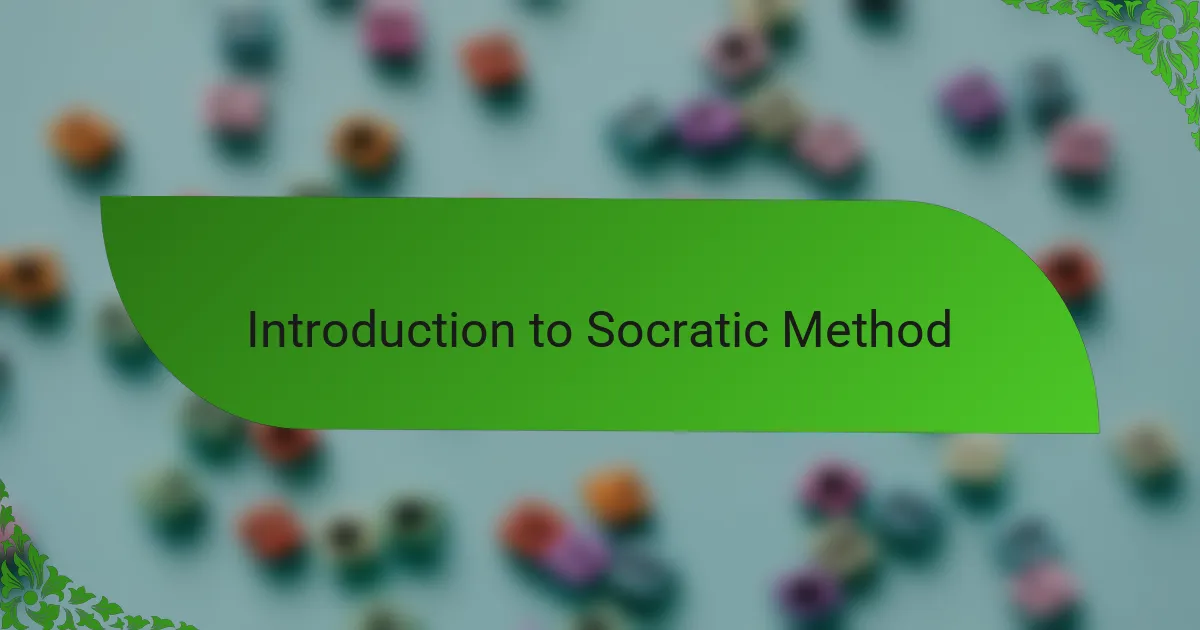
Introduction to Socratic Method
The Socratic Method, at its core, is a way of exploring ideas through questions rather than statements. When I first encountered it, I was struck by how it made me feel both challenged and curious, as if each question was opening a door to a deeper understanding.
Have you ever been in a conversation where, instead of being told what to think, you were gently guided to discover your own answers? That’s exactly the power of this method—it encourages us to think critically and reflectively.
What I find most compelling about the Socratic Method is its simplicity combined with depth. It’s not about winning an argument but about engaging in a thoughtful dialogue that continually pushes the boundaries of our knowledge.
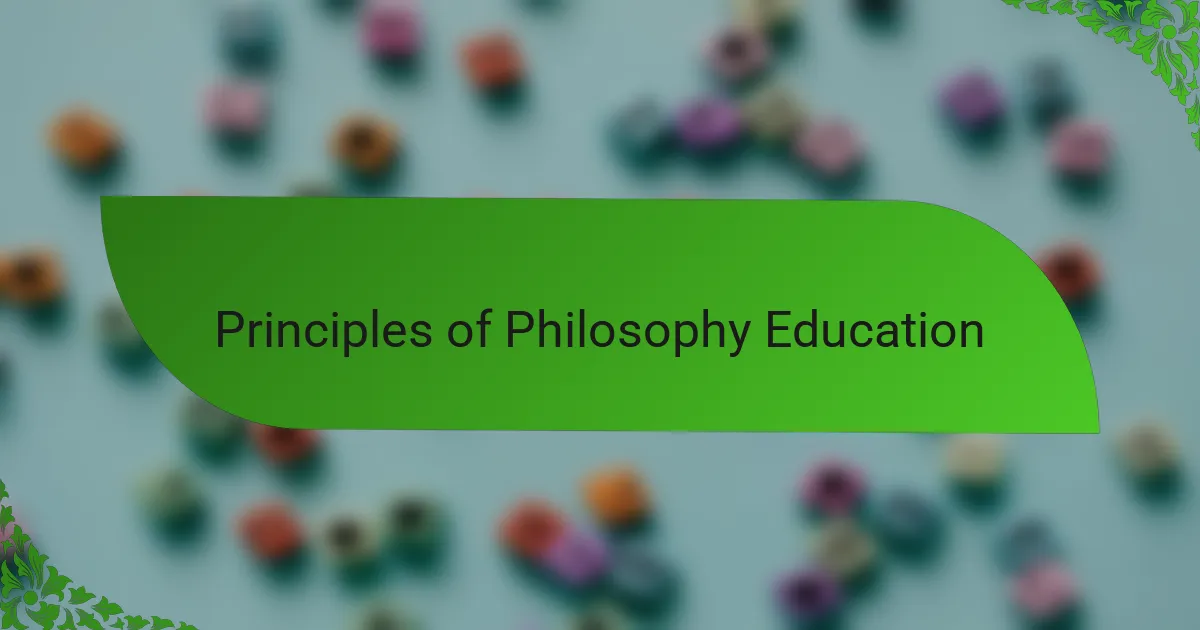
Principles of Philosophy Education
Philosophy education, to me, feels like cultivating a garden of curiosity. It’s built on principles that emphasize questioning over memorizing, encouraging students to wrestle with ideas rather than accept them at face value. Have you noticed how much richer learning becomes when you’re invited to explore rather than just absorb?
One principle I hold dear is fostering an environment where doubt is welcomed, not feared. I remember feeling hesitant to voice uncertainties in class until I realized that doubt is the starting point of genuine inquiry. This shift made philosophy feel less like a rigid subject and more like an exciting journey.
Another core idea is that philosophy education should be dialogic and collaborative. In my experience, discussing ideas with others often reveals layers I hadn’t considered alone. Isn’t it fascinating how our perspectives expand simply by being open to other viewpoints?
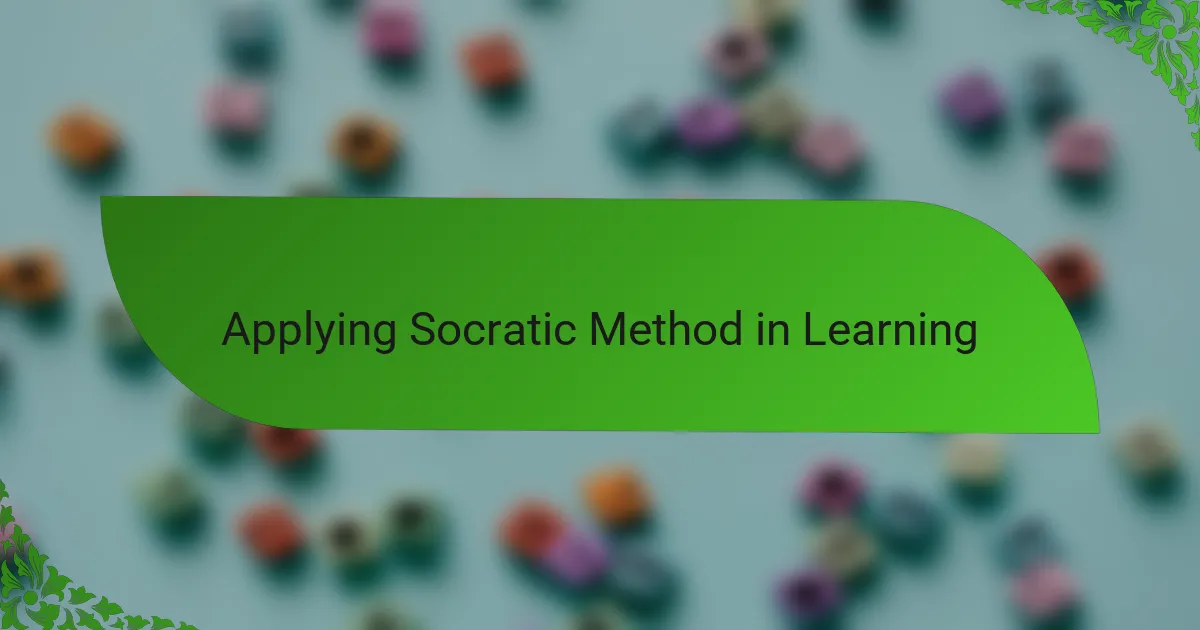
Applying Socratic Method in Learning
Applying the Socratic Method in learning has transformed how I approach new topics. Instead of passively receiving information, I ask myself probing questions like “Why do I think this is true?” or “What assumptions am I making?” This habit not only deepens my understanding but also keeps my curiosity alive during study sessions.
I recall a time when I struggled with a complex philosophical concept until I started breaking it down through targeted questioning. Each answer led me to a new question, and soon I felt the idea unfolding before me rather than feeling stuck. Doesn’t that feel more empowering than simply memorizing definitions?
What excites me most about using the Socratic Method in learning is the way it turns education into an active dialogue—often with myself but sometimes with peers. Have you noticed how this approach makes challenging material less intimidating and far more engaging? It’s like having a thoughtful conversation that never grows dull.
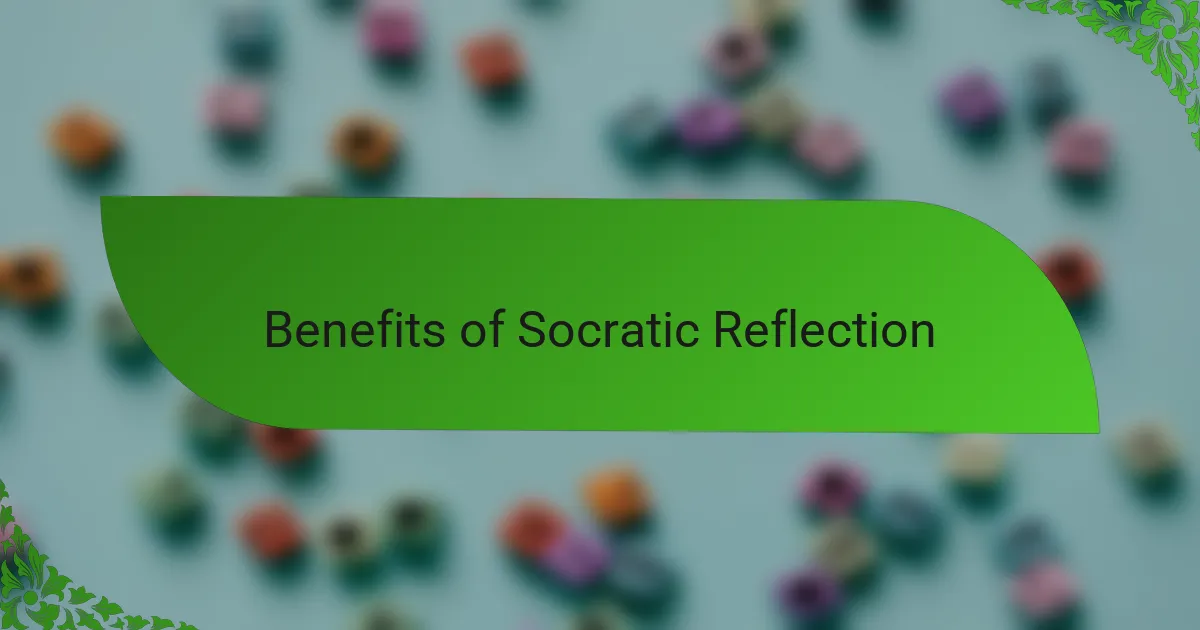
Benefits of Socratic Reflection
One of the biggest benefits I’ve discovered through Socratic reflection is how it sharpens critical thinking. When I reflect by asking myself tough, open-ended questions, I’m forced to move beyond surface answers and truly examine my beliefs. Isn’t it satisfying to realize that your initial assumptions can be challenged and refined in this way?
Another powerful advantage is the way Socratic reflection fosters intellectual humility. I’ve often found myself admitting, sometimes with a bit of discomfort, that I don’t have all the answers. Yet, this openness has led me to a more genuine understanding and a readiness to learn from others, which I now see as invaluable in philosophy education.
Finally, I’ve noticed that Socratic reflection deepens my engagement with philosophical ideas. Instead of passively summarizing concepts, reflecting Socratically turns learning into a personal dialogue where ideas become living questions. Doesn’t it feel more meaningful when you’re an active participant rather than just a listener in your own learning journey?
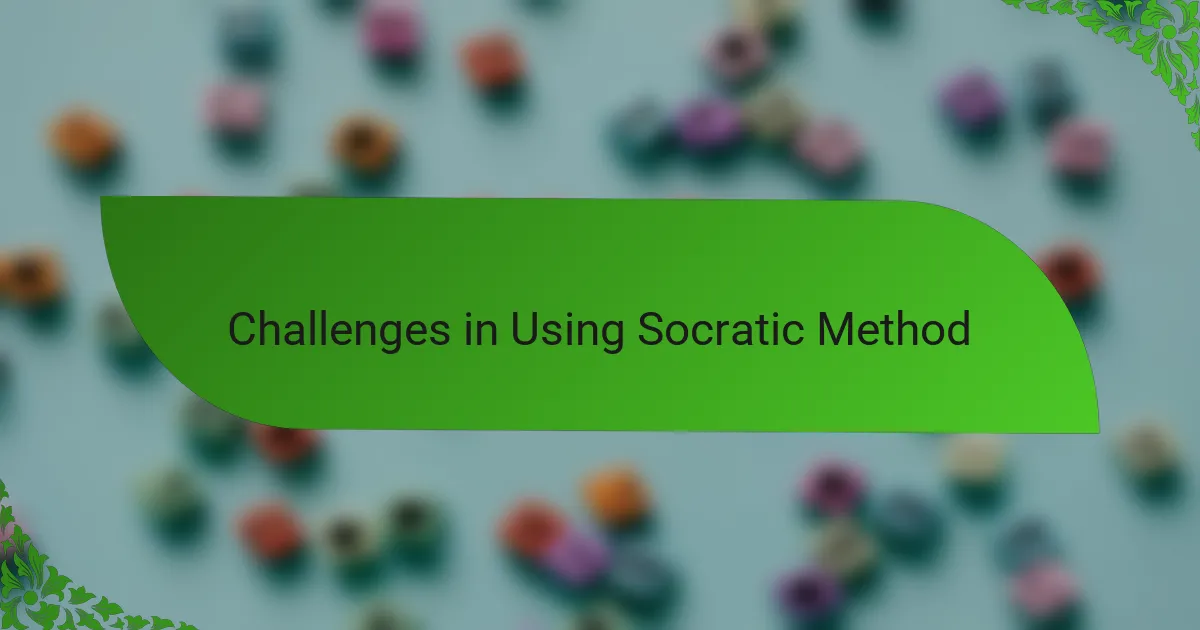
Challenges in Using Socratic Method
Using the Socratic Method isn’t always smooth sailing. I’ve often found that it can be challenging to maintain a balance between asking probing questions and avoiding making others feel interrogated or defensive. Have you ever noticed how quickly a genuine inquiry can turn into a tense exchange if the atmosphere isn’t carefully managed?
Another difficulty I’ve encountered is that not everyone is comfortable with uncertainty or open-ended questions. There were moments when I sensed impatience or frustration creeping in because the method doesn’t provide quick answers—just more questions. It made me realize that patience and a supportive environment are essential for this approach to flourish.
Sometimes, I struggled with the risk of drifting off-topic. It’s easy for a series of questions to lead down rabbit holes, losing sight of the original goal. Have you experienced that feeling when a discussion feels productive but then suddenly veers into a maze of complexity? Keeping focus while encouraging curiosity is a delicate dance, and mastering it takes practice.
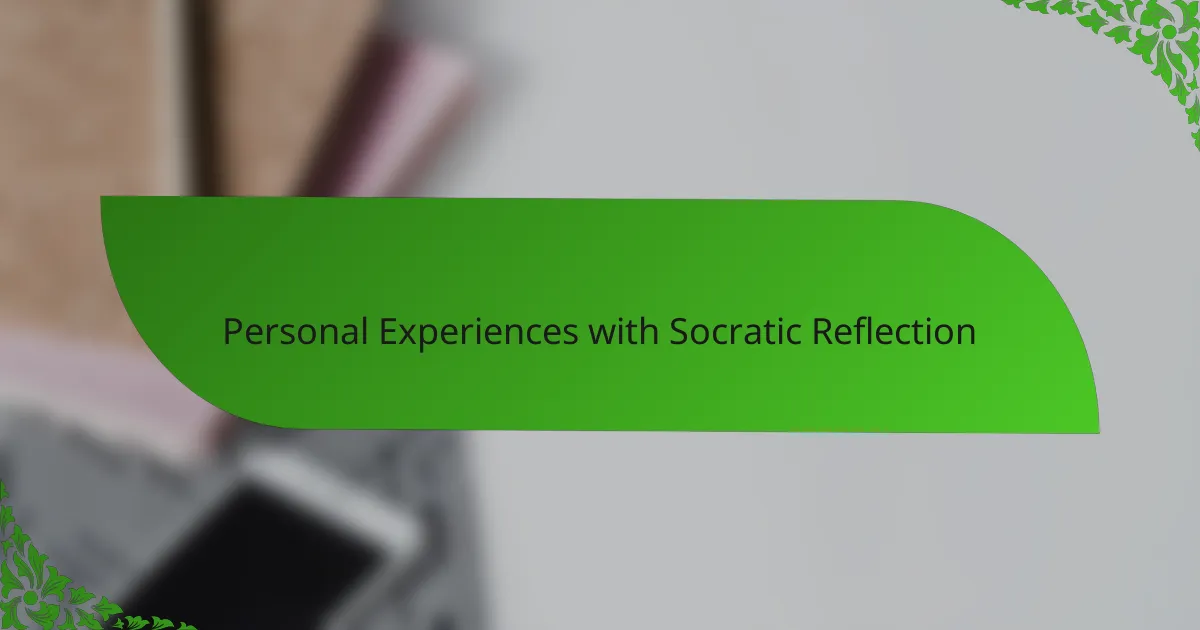
Personal Experiences with Socratic Reflection
Reflecting on my experiences with the Socratic Method, I remember a particular discussion where a friend’s simple question unsettled my long-held belief. At first, I felt defensive, but then curiosity took over, prompting me to re-examine my stance more honestly than I ever had before. Have you ever felt that moment when a question both challenges and liberates your thinking simultaneously? That tension between discomfort and insight is, to me, the heart of Socratic reflection.
There was also a time when I journaled my thoughts after a heated classroom debate guided by Socratic questioning. Writing out my responses forced me to slow down and engage deeply with my own assumptions—something I rarely did in the rush of conversation. This practice revealed biases I hadn’t noticed and sparked a genuine shift in how I approach uncertain ideas. Isn’t it remarkable how reflection can transform confusion into clarity when given the chance?
What strikes me most is how Socratic reflection feels less like a method and more like a habit forming over time—one that nudges me to listen more carefully and think more thoroughly. I find myself spontaneously asking, “But why?” even in everyday life, as if carrying a little internal dialogue that keeps my mind active and open. Have you noticed how a simple question can turn routine moments into opportunities for discovery? That’s the quiet power I’ve come to value deeply.
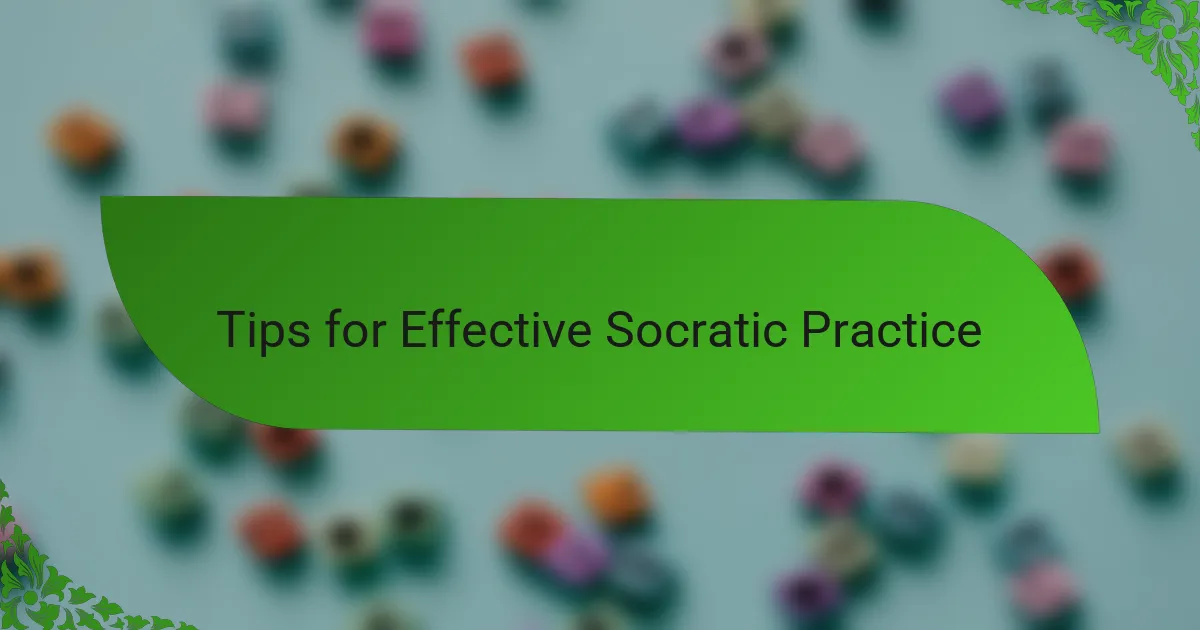
Tips for Effective Socratic Practice
One tip that really changed how I practice the Socratic Method is to focus on asking open-ended questions that invite exploration rather than yes-or-no answers. I remember a moment when shifting just a single question from “Is this right?” to “What makes this idea convincing?” opened up a whole new level of conversation. Have you ever tried that subtle change and noticed how it sparks deeper thinking?
Another approach I’ve found helpful is to listen actively and patiently, resisting the urge to jump in with your own conclusions. Sometimes, the most revealing insights come from pauses and silence after a question is posed. I’ve seen discussions bloom when everyone gets the space to reflect briefly before responding. Doesn’t that patience feel like creating room for genuine discovery rather than rushing to closure?
Lastly, it’s important to manage the tone of your questions—keeping them curious rather than confrontational. Early on, I realized that when my questions felt too probing or challenging, others would shut down or become defensive. But framing inquiries with a sense of shared exploration transformed the atmosphere, making conversations feel like collaborative journeys. Have you experienced that shift in tone making all the difference in engaging others thoughtfully?